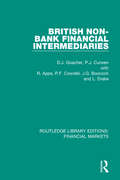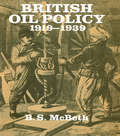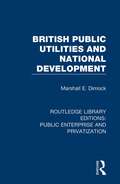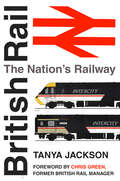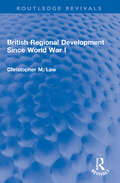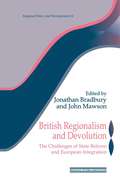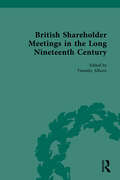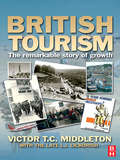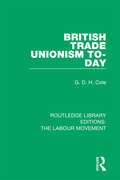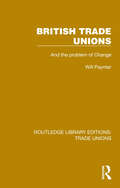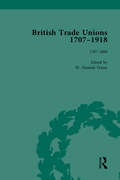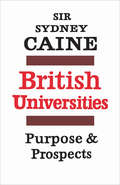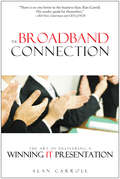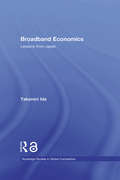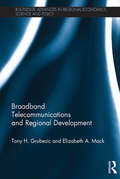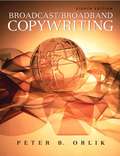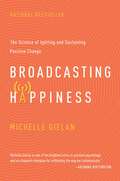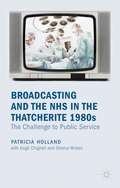- Table View
- List View
British Non-Bank Financial Intermediaries (Routledge Library Editions: Financial Markets #14)
by David J. Goacher Peter J Curwen R. Apps Grahame Boocock Leigh DrakeOriginally published in 1987, British Non-Bank Financial Intermediaries the book is the diversification of and overlaps in the operations of UK financial intermediaries forms. The book provides a coherent analysis of the broader implications of ongoing developments in the financial services sector and an insight into the ‘back-room activities of the non-bank institutions. The book also focuses on institutions offering some form of financial markets, within which many of the financial intermediaries operate. In doing this, the book outlines a theoretical framework of financial intermediation and provides an overview of the broader evolution of the UK financial system. This volume will be of use to students and practitioners studying in the financial services sector.
British Oil Policy 1919-1939
by B S McBethThs book examines the efforts made by the British government of the period to lessen its dependence on American oil supplies, the emergence of Venezuela as the largest single British oil supplier in the early 1930s, and the changing structure of the oil industry both in the US and Europe. It draws almost entirely on primary sources.
British Public Utilities and National Development (Routledge Library Editions: Public Enterprise and Privatization)
by Marshall E. DimockOne of the most important trends in post-war Britain was the extension of the number and variety of public service undertakings. Originally published in 1933, this title indicated the empirical nature and recent importance of British public utility development at the time, being the first study, which dealt with this trend in a comprehensive manner. For completeness to the book and also providing a suitable background, the local utility services water, gas, transport, docks, and harbors have been considered. The author felt the trends of recent years made a rediscovery of political economy imperative and urgent. This study was an effort to reunite economics, public administration, law, and philosophy in the consideration of British public utilities.
British Rail: The Nation's Railway
by Chris Green Tanya JacksonBritish Rail is a contentious company, as controversial as Dr Beeching and his axe. However, this examination of BR’s passenger services shows just how vital the organisation was. It successfully carried millions of commuters to and from their jobs every day; organised its trunk route services to yield a profit under the brand name ‘Inter-City’; and pioneered world-beating research and technological development through its own research centre and engineering subsidiary. It transformed the railway system of Britain from a post-Second World War state of collapse into a modern, technologically advanced railway. And it did all this despite being starved of cash and being subjected to the whims of ever-fickle politicians. British Rail: The Nation’s Railway is a story, expertly weaved by Tanya Jackson, of how all this was achieved against the odds. Complemented by stunning black-and-white and colour images, this is certainly a volume that no rail enthusiast should be without.
British Regional Development Since World War I (Routledge Revivals)
by Christopher M. LawFirst published in 1981, British Regional Development Since World War I presents a comprehensive and balanced introduction to the problems of regional development in Britain. Since World War I it has been possible to talk of Britain as two nations, a prosperous South including the Midlands, and a poor North. Christopher Law examines the nature and causes of this division, including impact of industrial structure, London’s role as capital in the spatial economy, and the influence of better environments on development. This valuable study will be an essential read for anyone interested in any aspect of regional development and development studies in the last ninety years.
British Regionalism and Devolution: The Challenges of State Reform and European Integration (Regions and Cities #Vol. 12)
by John Mawson Jonathan BradburyThis contributors provide a range of perspectives on the increasingly central issues of state reform, European integration and British regionalism in the 1990s. Using case material, the contributors examine: the effects of state reform and European integration on British regionalism and the devolution debate; and the nature of recent central responses to the re-emergence of regional and devolution issues, with a particular focus on the recent policies of the Major governments and the policies of the Opposition parties.They also present some evidence which suggests that state reform and EC/EU developments have determined and accentuated important new trends in British regionalism, and underpin the plausibility of far-reaching regional and devolution reforms.
British Satellite Broadcasting versus Sky Television
by Pankaj GhemawatDescribes the rivalry between two competitors who have attempted to become the dominant force in the emerging British satellite television industry. Can be used to examine issues of competitive positioning, technology adoption, and scenario analysis. Helps students make decisions given competitive challenges and industry uncertainties.
British Shareholder Meetings in the Long Nineteenth Century
by Timothy AlbornThis collection of reported British shareholder meetings originally published between 1800 and 1920 provides scholars and students new insight into the development of big businesses in the world today. Although such meetings comprised only one of many facets of companies’ intersections with their publics during the nineteenth century, they regularly provide a rich insight into each industry. This collection offers a breadth of examples, including utilities, land companies, and theatres as well as mining, insurance, banking, and transport, to allow readers to gain a sense of the protean nature of incorporation during the long nineteenth century. Following a general introduction, the book is divided into four sections: Doing the Business (on day-to-day financial operations), Politics (on corporate activities than intersected with British political and imperial concerns), Failure (on the communication and reception of financial ruin), and Mergers and Acquisitions (on shareholders’ responses to proposed mergers). Short introductions to each document provides the necessary information about each company and its constituents. This title will be of great interest to students of History, Business, and Finance.
British Stuff: 101 Objects That Make Britain Great
by Geoff Hall Kamila KasperowiczThis fascinating, full-colour, photographic compendium invites you to discover contemporary Britain through its everyday objects. Showcasing a wealth of iconic British design staples – from the Mini and the Anglepoise lamp to wellies and Worcestershire sauce – this must-have guide will help you to understand British culture from the inside out.
British Stuff: 101 Objects That Make Britain Great
by Geoff Hall Kamila KasperowiczThis fascinating, full-colour, photographic compendium invites you to discover contemporary Britain through its everyday objects. Showcasing a wealth of iconic British design staples – from the Mini and the Anglepoise lamp to wellies and Worcestershire sauce – this must-have guide will help you to understand British culture from the inside out.
British Tourism: The Remarkable Story Of Growth
by Leonard J Lickorish Victor T.C. MiddletonTourism at any point in time is in many ways a mirror of economic and social change. The changes in British society in the decades from the 1950s to the 21st century are reflected in the forms of tourism that the British have been able to aspire to and afford. 'British Tourism: A Remarkable Story of Growth' identifies the most significant of these changes and places them in an historical context highlighting four distinctive eras. Now in paperback it includes four colour photos as well as two brand new chapters on tourism in Scotland and Wales.It looks in detail at the following key areas: * The roots of post war tourism growth * Developments in transport and regulation * Developments in accommodation and visit attractions * Marketing developments and trends - the role of entrepreneurs * Tourism trends into the 21st centuryOffering a comprehensive evaluation of post war developemnts in the British tourism industry, British Tourism: The remarkable story of growth, acts as a single reference resource suitable for a wide ranging readership from students on tourism courses and practitioners in the travel and tourism industries
British Trade Unionism To-Day (Routledge Library Editions: The Labour Movement #6)
by G. D. ColeFirst published in 1939. This book provides a balanced picture of Trade Unionism as it was in the 1930s, both in general and in each of the principal industries and services. The study opens with a brief outline of Trade Union history, before examining Trade Unions in various industries, including mining, transport, and the postal service. British Trade Unionism To-Day will be of great interest to students and scholars of labour and political history.
British Trade Unions (Routledge Library Editions: Trade Unions #17)
by Will PaynterOriginally published in 1970 this book was written by a successful trade union leader. It describes the changes which took place in the environment in which trade unions have to function; the vast modern corporations, with their highly professional management and often with an international base making them almost immune to pressure in any one country; the technological revolution; the direct involvement of government in industrial relations, prices and incomes policy and the international pressures which impel government intervention.
British Trade Unions, 1707–1918, Part I, Volume 1: 1707-1800
by W Hamish FraserDrawing from a variety of libraries and archives, this collection brings together material to illustrate the history of the development of trade unionism and industrial relations. It spans the period from the early journeymen's trade societies as they emerged in the 18th-Century through to the end of the First World War. Part I Volume 1 looks at 1707-1800.
British Universities: Purpose and Prospects
by Sydney CaineSince the last war there have been enormous increases in the numbers of universities and of students. Yet it tends to be assumed that the concepts which were valid for the dozen or so universities and the tens of thousands of students of the 1900's are still valid for the fifty universities and the hundreds of thousands of students of today.Sir Sydney Caine was Director of the London School of Economics from 1957-67. Before that he had been for four years Vice-Chancellor of the University of Malaya and had served for twenty-five years in the Civil Service – in the Colonial Office, in the Colonial Service as Financial Secretary of Hong Kong, and in the Treasury. He is thus equipped to give a balanced assessment of the state of British universities today when their almost complete financial dependence on the state makes the relationship between the universities and the Government one of the central topics in any such discussion.The book examines a number of inter-related questions which are seldom asked. What are the objectives of a university? Is there a proper balance between teaching and research? Is it right that secondary school curricula should be to so great an extent determined by university entrance requirements? With the increase in their numbers are graduates any longer in any sense an élite? What are the underlying causes of the current malaise among students? What is the value of university education to the society which provides it, and should there be a special tax on graduates' earnings? What is the role of universities in relation to other forms of further education? How and to what extent should teachers – and students – participate in university government? Can alternative methods of financing universities be found which will give students a greater sense of responsibility and lead to the loosening of wasteful rigidities of organisation – in degree patterns, length of courses etc?Much of the confusion of purpose evident in higher educational policy today has risen because these and related questions have not been asked. Sir Sydney Caine examines them fairly and thoroughly, weighting the need to respect academic independence against the public interest. The result is a most stimulating discussion on a topic of vital concern for the future of Britain.
Britney Makes a Budget (Rosen Common Core Readers)
by Madelyn McManusThis book provides additional learning opportunities through a graphic organizer, glossary, and index.
Broad Money Demand and Asset Substitution in China
by Ge WuA report from the International Monetary Fund.
Broadband Connection: The Art of Delivering a Winning IT Presentation
by Alan CarrollIt's no secret that many IT professionals hate presenting and are often very bad at it. Focusing on technical details and speaking in monotone, they can quickly lose their audiences' attention and interest. Effective presentation skills are critical to the careers of IT professionals and the proper utilization of corporate resources.The Broadband Connection will show IT professionals how to become articulate, effective, and persuasive speakers-no matter how difficult the information being disseminated.In The Broadband Connection, author and expert Alan Carroll, a transpersonal psychologist who has helped thousands of IT professionals worldwide evolve from nervous, insecure speakers into savvy, successful presenters, offers his proven strategies in this fresh and innovative step-by-step guidebook. Utilizing language and principles specific to the IT industry, the author teaches vital presentation skills in a familiar language the reader can identify with and understand. This book provides the tools to unleash the graceful speaker hidden inside every IT professional.
Broadband Economics: Lessons from Japan (Routledge Studies in Global Competition)
by Takanori IdaJapan's high-speed Internet access services such as ADSL, CATV Internet and FTTH are considered the cheapest and fastest state-of-the-art services drawing international attention. In this book the author introduces the current status of broadband services in Japan and their recent development in competition policy. An econometric model is proposed and discussed to analyse access demand. The purpose of the analysis is to understand quantitively the current status of the rapidly developing Japanese broadband services while providing an academic and practical basis for conceiving prospective competition policies. The book is composed of three parts. The first part introduces the diffusion of current Broadband services, the economics of network industries and related econometric model analysis. The second part elucidates in detail the development of fixed-line broadband services, IP phone services as well as mobile phone services. The third part consequently investigates the migration among broadband services, the fixed and mobile convergence and the digital divide problem.
Broadband Networks, Smart Grids and Climate Change
by Eli M. Noam Lorenzo Maria Pupillo Johann J. KranzIn smart grids the formerly separated worlds of energy and telecommunication converge to an interactive and automated energy supply system. Driven by social, legal, and economic pressures, energy systems around the globe are updated with information and communication technology. These investments aim at enhancing energy efficiency, securing affordable energy supply, and mitigate climate change. In Broadband Networks, Smart Grids and Climate Change, renowned scholars and managers from the fields of energy and telecommunication address key questions related to technological, strategic, and regulatory issues revealing consequences and opportunities for businesses evolving with smart grids. In particular, this book analyzes: (1) the effects on climate change protection (2) national energy and broadband politics (3) regulatory approaches and requirements (4) emerging business models
Broadband Telecommunications and Regional Development (Routledge Advances in Regional Economics, Science and Policy)
by Tony H. Grubesic Elizabeth A. MackBroadband is one of the most transformative technologies of the 21st century, yet our understanding of its regional impacts remains somewhat rudimentary. Not only are issues of broadband pricing and speed relevant in this context, but the overall quality of service for broadband can often dictate its impacts on regional development. This book illuminates the regional impacts of this pervasive and important technology. The principle aim of this book is to deepen our understanding of broadband and its connections to regional development. First, it uses a geospatial lens to explore how the relationship between broadband and regional development influences access to technology platforms, dictates provision patterns, and facilitates the shrinkage of space and time in non-uniform and sometimes unexpected ways. Second, it book provides a comprehensive guide that details the strengths and weaknesses of publically available broadband data and their associated uncertainties, allowing regional development professionals and researchers to make more informed decisions regarding data use, analytical models and policy recommendations. Finally, this book is the first to detail the growing importance of broadband to digital innovation and entrepreneurship in regions. This book will be of interest to regional development professionals and researchers in economics, public policy, geography, regional science and planning.
Broadcast/Broadband Copywriting
by Peter OrlikBroadcast/Broadband Copywriting is the most widely used book for learning how to write all types of copy for the electronic media. <P><P>This book addresses the fundamental rules and techniques common to electronic media scripting with a depth of coverage unmatched by other texts, but without assuming any prior media writing, production, or advertising experience on the part of the reader.
Broadcasting Happiness: The Science of Igniting and Sustaining Positive Change
by Michelle GielanBroadcasting Happiness will "inspire you and change your life." —Parade Magazine We are all broadcasters. As managers, colleagues, parents and friends, we are constantly transmitting information to the people around us, and the messages we choose to broadcast create success or hold us back. What's your broadcast? New research from the fields of positive psychology and neuroscience shows that small shifts in the way we communicate can create big ripple effects on business and educational outcomes, including 31 percent higher productivity, 25 percent better performance ratings, 37 percent higher sales, and 23 percent lower levels of stress. In Broadcasting Happiness, Michelle Gielan, former national CBS News anchor turned positive psychology researcher, shows you how changing your broadcast changes your power by sharing jaw-dropping stories and incredible research. Learn Michelle's simple research-based communication habits that have been featured in her PBS program Inspire Happiness and Oprah's 21 Days to Happiness class. Broadcasting Happiness will help you: - Inoculate your brain against stress and negativity by fact-checking challenges - Drive success by leading a conversation or communication with positivity - Rewrite debilitating thought patterns and turn them into fuel for resilience and growth - Deal with negative people in a way that lessens their power - Share bad news more effectively to increase future social capital - Create and sustain a positive culture at work or home by creating contagious optimism - Help the people you care about most move from negative to positive in seconds Broadcasting Happiness showcases how real individuals and organizations have used these techniques to achieve results that include increasing revenues by hundreds of millions of dollars, raising a school district's graduation rate by 45 percent, and shifting family gatherings from toxic to thriving. Changing your broadcast can change your life, your success, and the lives of others around you. Broadcasting Happiness will show you how!
Broadcasting Hollywood: The Struggle Over Feature Films on Early TV
by Jennifer PorstBroadcasting Hollywood: The Struggle Over Feature Films on Early Television uses extensive archival research into the files of studios, networks, advertising agencies, unions and guilds, theatre associations, the FCC, and key legal cases to analyze the tensions and synergies between the film and television industries in the early years of television. This analysis of the case study of the struggle over Hollywood’s feature films appearing on television in the 1940s and 1950s illustrates that the notion of an industry misunderstands the complex array of stakeholders who work in and profit from a media sector, and models a variegated examination of the history of media industries. Ultimately, it draws a parallel to the contemporary period and the introduction of digital media to highlight the fact that history repeats itself and can therefore play a key role in helping media industry scholars and practitioners to understand and navigate contemporary industrial phenomena.
Broadcasting and the NHS in the Thatcherite 1980s
by Hugh Chignell Patricia Holland Sherryl WilsonPatricia Holland offers a fascinating study of the ways in which changes to public services, and shifts in the concept of 'the public' under Margaret Thatcher's three Conservative governments, were mediated by radio and television in the 1980s.
